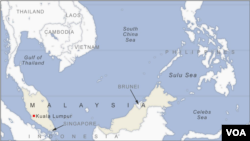Rights groups say Malaysian authorities are ramping up the use of criminal investigations into journalists, protesters and opposition lawmakers to harass the government’s critics, shrinking the space for free speech and a free press in the Southeast Asian country.
“Basic freedoms have come increasingly under attack since Prime Minister Muhyiddin Yassin’s government came to power last year through backdoor maneuvering, and this latest wave of investigations and harassment clearly aims to silence political opponents and all forms of dissent,” Carlos Zarate, a member of the Philippine House of Representatives, said in a statement put out this week by ASEAN Parliamentarians for Human Rights, a network of lawmakers from across the region.
Muhyiddin rose to the prime minister’s post early last year without an election after he and other lawmakers abandoned the ruling coalition to form a new bloc of parties with a slim majority in Parliament. With the requisite consent of the country’s constitutional monarch, Al-Sultan Abdullah, he instituted a state of emergency in January that suspended Parliament and allowed him to rule by decree.
Muhyiddin said he needed the emergency powers to combat the pandemic. Analysts say it is more likely a bid to postpone his own coalition’s collapse at the hands of disaffected partners by avoiding a no-confidence vote. Rights groups in turn say the latest wave of investigations into government critics stems at least in part from Muhyiddin’s mounting anxiety about his political survival.
‘Censor yourself’
The ASEAN parliamentarians’ group said police interrogated five opposition lawmakers this month alone, along with more than two dozen activists, most of them over a series of peaceful protests of the government.
Police have also issued summonses for journalists over their articles five times since the emergency took effect, according to a trio of local journalists’ associations.
“So the message that’s coming out is, unless you censor yourself … you’re going to be summoned,” Wathshlah Naidu, executive director of Malaysia’s Center for Independent Journalism, told VOA.
“This is extremely troubling because all these [cases] are pointing to the fact that we are reaching a situation that media journalists are even afraid of asking the right questions and publishing because they fear being threatened.”
Calls to the prime minister’s office seeking comment went unanswered. Emails requesting interviews with the national police and the Home Affairs Ministry, which oversees the police, were also unanswered.
Malaysia slipped 18 places during the past year in Reporters Without Borders’ annual index of press freedom around the world, from 101 out of 180 countries to 119, by far the largest slide of any nation on the list.
In one recent case, two reporters were summoned for covering allegations that police brutality had caused the death in custody of milk trader A. Ganapathy. In another, the Home Affairs Ministry said it would be summoning two news outlets for articles quoting a top official who appeared to make light of allegations that a secondary school teacher had made jokes about rape in class.
“To say that that is criminal, to investigate that as a criminal investigation shows a real lack of either understanding of or respect for the role of the media in a democracy,” said Linda Lakhdhir, Asia legal adviser for the U.S.-based Human Rights Watch.
Lakhdhir also highlighted the case of opposition lawmaker Syed Saddiq, who was questioned by police over a video he posted of himself online calling for accountability in the milk trader’s death.
“He is an MP; this is his job,” she said. “And even if these cases don’t result in prosecutions, there’s a harassment element and an intimidation element, especially with some of the heavy-handed tactics they’re using, that is intended to create a sort of culture of self-censorship.”
Last month, police allegedly smashed a hole through graphic artist Fahmi Reza’s door before arresting him. Fahmi is under investigation for sedition for posting a Spotify playlist online on the theme of jealousy to poke fun at Malaysia’s Queen Tunku Azizah Aminah Maimunah. The queen was reported to have called those who alleged she had jumped the line for a COVID vaccine, “jealous.”
‘Fear factor’
To rights groups this is but the latest example of the overbroad interpretation of a set of vaguely worded laws Malaysian authorities have been using for years to snare the government’s critics. They say amending or abolishing those laws will be key to reclaiming the quickly shrinking space for free speech and a free press in the country.
“We are walking backwards very fast,” said Zulfikar Anwar Ulhaque, no stranger to the authorities’ attention himself.
The multiple-award-winning cartoonist, better known as Zunar, said he has been arrested seven times and charged nine times under six laws in the past 11 years for his politically charged drawings. He and his book publishers have had their offices repeatedly raided by police.
On May 7 police interrogated Zulfikar yet again, this time over a cartoon he posted to his social media accounts lampooning the Kedah state chief minister for cancelling a public holiday marking a Hindu festival, citing COVID-19 concerns. The police also confiscated his mobile phone and demanded his passcode.
“There is no place for people to speak up now in mainstream media, no venue for them to go [to] because all the media are controlled by the government, and because of that people turn to social media,” he said.
Rights groups fear the crackdown on journalists, activists and lawmakers is rippling through society, piling pressure on ordinary Malaysians to keep any critical thoughts about the government to themselves.
Zulfikar, who is now 59, said he is worried about what it means for new political cartoonists.
“This is the fear factor,” he said. “They are hoping that people will [be] scared — those who try to do cartoons, serious cartoons, try to do political cartoons to criticize the government. They will think twice, they will think twice because of this.”




